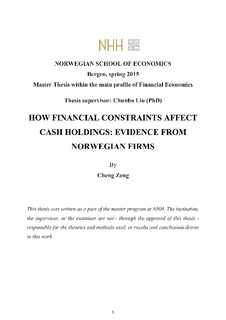How financial constraints affect cash holdings : evidence from Norwegian firms
Master thesis
Permanent lenke
http://hdl.handle.net/11250/300951Utgivelsesdato
2015Metadata
Vis full innførselSamlinger
- Master Thesis [4372]
Sammendrag
This paper examines the cash holding and how it is determined by financial constraints of
corporate Norway using a comprehensive dataset that covers both private and public firms
from 1995 to 2012. I find that aggregate cash holdings increase almost twofold from 1990s
(around 5-6%) to recent years (9-10%), a trend similar to U.S. firms, though slightly less
significant. I then examine the correlation between cash holdings and financial constraints
both on the aggregate level and the individual firm level. Time series evidence supports the
notion that aggregate cash holdings decline following better macro-economic conditions.
However, firm-level cash holdings are negatively correlated with conventional measures of
financial constraints, such as Whited-Wu index and Hadlock and Pierce index. The
contradiction with theory here implies that the extent of financial constraint might be mismeasured,
an issue recently discussed in Farre-Mensa and Ljungqvist (2013). I use two event
studies to revolve the measurement error and endogeneity problem involved. Specifically, I
trace the evolution of cash holdings around IPO and delisting events which suddenly alter the
extent of financial constraints faced by firms. I find that the cash ratio decreases roughly by
35% within two years after a private firm becomes public and increases by 37.5% two years
after a public firm goes private, which is in line with cash holdings increasing with financial
constraints. This finding is robust to several competing hypotheses, such as changes in
corporate governance and growth opportunities around such events.
